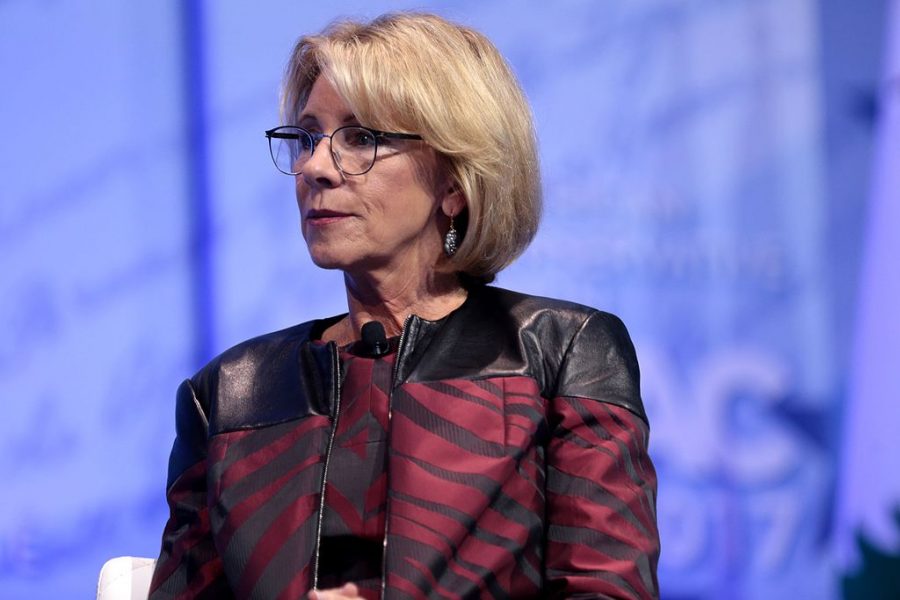Why Students Should Know About Betsy Devos
Betsy Devos became more well known after her hearing before the senate where she avoided answering certain questions. Photo by Gage Skidmore from Peoria, AZ, United States of America (Betsy DeVos), via Wikimedia Commons.
September 14, 2018
Currently in the United States, 50.7 million students rely on public school to receive an education.
Almost 1,000 teenagers depend on Susquehannock High School to help shape their future.
The institutions that teach us, feed us and provide us with opportunities for a better life are in danger.
Education Secretary Betsy Devos, while not discussed as often as other cabinet members, has the most influence over the future.
The education of younger generations sits in her unqualified hands.
Devos, most famous for stating schools in Wyoming should have guns to defend against bears, is a billionaire philanthropist and Republican activist from Michigan who worked with politicians to privatize the education system through for-profit charter schools.
Reporter for the Detroit Free Press Stephen Henderson explains the damaging effects of Devos’s involvement.
“Largely as a result of the DeVos’ lobbying, Michigan tolerates more low-performing charter schools than just about any other state,” wrote Stephen Henderson in a Detroit Free Press article. “And it lacks any effective mechanism for shutting down, or even improving, failing charters.”
Even though she created voucher programs and passed laws to use public funds to pay the tuition for some students, the problem with the charter schools she helped to create is they infamously have the lowest test scores in the country.
“In other states, poor performers are subject to improvement efforts, or sometimes closed,” wrote Henderson. “By contrast, once a school opens in Michigan, it’s free to operate for as long as it wants, and is seldom held accountable by state officials for its performance… And in Michigan, you can operate a charter for profit, so even schools that fail academically are worth keeping open because they can make money. Michigan leads the nation in the number of schools operated for profit, while other states have moved to curb the expansion of for-profit charters, or banned them outright.”
The schools operate under little to no supervision, allowing superintendents to earn as much as $130,000 a year and the charters to be renewed.
“…the DeVos family contributed $1.45 million over two months — an astounding average of $25,000 a day — to Michigan GOP lawmakers and the state party after the Republican-led Legislature derailed a bipartisan provision that would have provided more charter school oversight in Detroit,” wrote Henderson.
Through her efforts to earn more money from schools, Devos has transformed Michigan into a “laughing stock” of the country due to their poor education system.
Michigan is just an example of the damage Devos has done. Now she has the help of federal funds to carry out her vision.
During her first hearing before the senate, the American Civil Liberties Union of Michigan (ACLU) released an official statement in opposition to her.
“She has ardently supported the unlimited, unregulated growth of charter schools in Michigan, elevating for-profit schools with no consideration of the severe harm done to traditional public schools,” wrote Executive Director of ACLU of Michigan Kary Moss on their website. “She’s done this despite overwhelming evidence that proves that charters do no better at educating children than traditional public schools and serve only to exacerbate funding problems for cash-strapped public districts. We believe that all children have a right to a quality public education, and we fear that Betsy DeVos’ relentless advocacy of charter schools and vouchers betrays these principles.”
Now, with $20 million in federal funds, Devos has the power to block state grants and voucher programs to undermine Title I, a federal program dedicated to providing students equal access to primary and secondary schools.
Professor of Sociology and Education at Columbia University Aaron Pallas explains how the change in spending will harm public schools.
“The shift of funds away from public school districts creates further stresses on traditional public schools,” wrote Pallas in a The Hechinger Report article. “They are deprived of longstanding resources that compensate for the unwillingness of most states to provide adequate levels of funding for those districts that lack the capacity to raise enough money from local property tax revenues.”
Though she poses a threat to public education, Devos is popular among pro-school-choice groups that allow parents to have more control within their child’s school.
The form of this control mostly only extending to being able to choose the school they want to attend.
The expansion of Charter schools in Michigan won full support from these types of groups.
However, the choice creates a more segregated education environment for both public and charter schools.
Researcher and education professor at Western Michigan University explains the consequences of choice.
“The outcomes we can measure show it’s leading to increased segregation and increased burdens for districts,” said Gary Miron in Mike Wilkinson Bridge article. “If we are talking about choice as a market tool and we apply it as a market tool, there’s going to be winners and losers. Mostly kids are losing and your public schools are being damaged.”
This specifically targets inner city and poorer students who do not have enough money or transportation to access better performing schools outside their district.
Even though most school funding related decisions are controlled by state governments, it is important for students to know who is pulling the strings on their education.
Betsy Devos is an unqualified Education Secretary that destroyed the teaching system of Michigan and her lack of knowledge is the most infuriating aspect of her holding such an influential position.
“DeVos isn’t an educator, or an education leader,” wrote Henderson. “She’s not an expert in pedagogy or curriculum or school governance. In fact, she has no relevant credentials or experience for a job setting standards and guiding dollars for the nation’s public schools. She is, in essence, a lobbyist — someone who has used her extraordinary wealth to influence the conversation about education reform, and to bend that conversation to her ideological convictions despite the dearth of evidence supporting them.”
Her ignorance towards public schools only places more stress upon the institutions, causing a decrease in money and overall performance of students.
This may appear to students as a consequence with little to no impact on them, but it is not rare to hear a teacher asking them to use less paper or not damage simple supplies they bought with their own money.
Schools that struggle with funding are more likely to have lower test scores and provide students with fewer opportunities.
By learning about the people in power who control a certain aspect of life, students can work together to petition and prevent problems from occurring.





